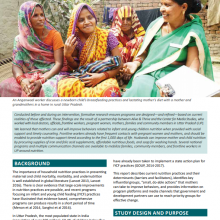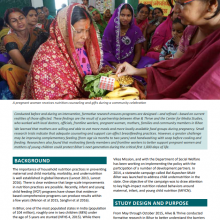Journal article
May 01 2018

Dietary diversity predicts the adequacy of micronutrient intake in pregnant adolescent girls and women in Bangladesh, but use of the 5-group cutoff poorly identifies individuals with inadequate intake (Nguyen PH., 2018. Journal of Nutrition)
The Minimum Dietary Diversity for Women (MDD-W) indicator based on a 10-food group women dietary diversity score (WDDS-10) has been validated to assess dietary quality in nonpregnant women.
Brief
Feb 07 2017

Nutrition practices in Uttar Pradesh (UP): Results from a formative research study
Alive & Thrive conducted formative research to better understand the nutrition practices in Uttar Pradesh. We found that mothers can and will improve behaviors related to infant and young children nutrition when provided with social support and timely counseling.
Brief
Feb 07 2017

Nutrition practices in Bihar: Results of a formative research study
Alive & Thrive conducted formative research to better understand the nutrition practices in Bihar. We learned that mothers are willing and able to eat more meals and more locally available food groups during pregnancy. Read our formative research brief to learn about other findings.
Journal article
Jan 25 2017

Changes in underlying determinants explain rapid increases in child linear growth in Alive & Thrive study areas between 2010 and 2014 in Bangladesh and Viet Nam (Nguyen PH., 2016. Journal of Nutrition)
This study aimed to better understand what changes in underlying socioeconomic characteristics and behavioral factors are important in explaining improvements in child linear growth in A&T study areas in Bangladesh and Viet Nam.
Journal article
Dec 28 2016

Large-scale behavior-change initiative for infant and young child feeding advanced language and motor development in a cluster-randomized program evaluation in Bangladesh (Frongillo EA., 2017. Journal of Nutrition)
Improving infant and young child feeding (IYCF) has the potential to contribute to child development outcomes as well as nutrition.
Journal article
Oct 25 2016

Impacts on breastfeeding practices of at-scale strategies that combine intensive interpersonal counseling, mass media, and community mobilization: results of cluster-randomized program evaluations in Bangladesh and Viet Nam (Menon P., 2016. PLOS Med)
In Bangladesh and Viet Nam between 2009–2014, Alive & Thrive (A&T) worked to improve breastfeeding practices through intensified interpersonal counseling (IPC), mass media (MM), and community mobilization (CM) intervention components delivered at scale in the context of policy advocacy (P

